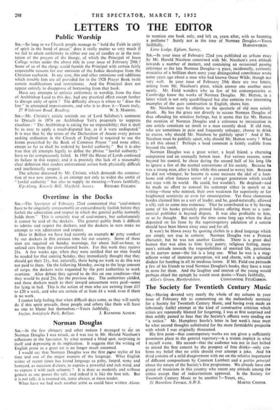SIR,—Mr. Christie's article reminds me of Lord Salisbury's comment to
Disraeli in 1874 on Archbishop Tait's proposals to suppress ritualism : " The Archbishop is asking for an impossibility; that it shall be as easy to apply a much-disputed law, as if it were undisputed." It is true that by the terms of the Declaration of Assent every person seeking ordination in the Church of England is required to use the forms prescribed by the Book of Common Prayer " and none other, except so far as shall be ordered by lawful authority." But it is also true that all attempts legally to define the phrase " lawful authority " have so far conspicuously failed. In 1905 the House of Lords confessed its failure in this respect; and it is precisely this lack of a reasonably clear definition that renders enforcement action both physically difficult and intellectually suspect.
The scheme discussed by Mr. Christie, which demands the construc- tion of two new canons, is an attempt not only to widen the ambit of " lawful authority " but also to supply its meaning.—Yours faithfully,
Up-Along, Knowle Hill, Mayfield, Sussex. RICHARD FEILDEN.


































 Previous page
Previous page